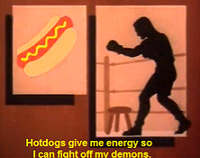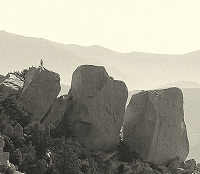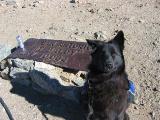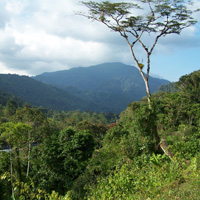Interesting tidbit.
http://www.nytimes.com/2010/10/19/healt ... ted=2&_r=1
How do you push past the pain?
How to Push Past the Pain, as the Champions Do (NYTimes)
-
Taco

- Snownado survivor
- Posts: 6131
- Joined: Thu Sep 27, 2007 4:35 pm
It's just part of the fun. It's like a really cold bivie with no bag or shelter, and the weather is bad. 
-
Ze Hiker

- Posts: 1432
- Joined: Mon Jul 28, 2008 7:14 pm
I read that article yesterday, and it sucks. Leave it to NY Times health bozo writers to put stuff that doesn't say shit, other than, hey you have to endure pain to improve performance. Where's the science? none.
And other articles where they can't count calories = epic fail. That's what happens when you have journalists writing about exercise without knowing exercise physiology.
And other articles where they can't count calories = epic fail. That's what happens when you have journalists writing about exercise without knowing exercise physiology.
-
lilbitmo

- Posts: 1092
- Joined: Tue Mar 04, 2008 9:44 pm
Let's take that writer up Iron, traverse to Baldy and back, then C2C the next day and he can at least have some data (his own experience and what's left of him) to write about after thatZé wrote:I read that article yesterday, and it sucks. Leave it to NY Times health bozo writers to put stuff that doesn't say shit, other than, hey you have to endure pain to improve performance. Where's the science? none.
And other articles where they can't count calories = epic fail. That's what happens when you have journalists writing about exercise without knowing exercise physiology.
-
kristo5747

- Posts: 102
- Joined: Tue Sep 15, 2009 3:09 pm
Only meant to get this thread started....looks like it worked! Yeehaw!!lilbitmo wrote:Let's take that writer up Iron, traverse to Baldy and back, then C2C the next day and he can at least have some data (his own experience and what's left of him) to write about after thatZé wrote:I read that article yesterday, and it sucks. Leave it to NY Times health bozo writers to put stuff that doesn't say shit, other than, hey you have to endure pain to improve performance. Where's the science? none.
And other articles where they can't count calories = epic fail. That's what happens when you have journalists writing about exercise without knowing exercise physiology.
Seriously, Ze, it's obviously written for the masses, not experienced guys like you. My attitude is that I read something and do my best to research on my own.
Even for a layman like me, that article felt "light" but was nevertheless interesting. Pointless to get mad about it though...
Taco: you forget snow and hail
-
Bill

- Posts: 332
- Joined: Thu Jul 24, 2008 6:09 pm
I defer to your scientific and nutritional expertise, and I am no fan of the NY times either but you have to admit, that one big separating factor has to be mental toughness. Attitude is everything when you reach your physical limits, at least for me.Zé wrote:I read that article yesterday, and it sucks. Leave it to NY Times health bozo writers to put stuff that doesn't say shit, other than, hey you have to endure pain to improve performance. Where's the science? none.
And other articles where they can't count calories = epic fail. That's what happens when you have journalists writing about exercise without knowing exercise physiology.
-
Ze Hiker

- Posts: 1432
- Joined: Mon Jul 28, 2008 7:14 pm
Sorry I didn't mean to knock on the subject per se, I think its good a good discussion for here.
I just have a thing with these writers, let's just say they get a lot wrong...
Attitude is a lot of it, but perhaps the level of pain experienced is different between people. Maybe one guy (via genetics, different physiology) experiences more pain than another guy of similar build and conditioning. So he can't last as long - doesn't mean he doesn't have as much "will power". It would have been cool to read something on this subject.
Mental toughness is important. But isn't that obvious? Good discussion, but that article didn't teach me anything.
I'd imagine the pain / willpower thing is increasingly important as event duration increases. No doubt there is pain when doing a mile run, but I think most competitive athletes can handle the pain during the race, but there are other limiting factors (some from not being able to handle the pain during training). During a marathon, pain is probably more of a limiting factor.
When I did two skylines, the 2nd one I wanted to get in a certain time so I kept pushing through the pain, and I had never been pushing myself like that for that long. Being in pain for that long is an interesting thing, I certainly think ultra endurance events are won by those who can handle the most pain. But normally, when hiking is painful, you can slow down. There's no time requirement. Of course there's still pain, but it could be below your tolerance level, just depends what background you come from. Excuse the rambling...
I just have a thing with these writers, let's just say they get a lot wrong...
Attitude is a lot of it, but perhaps the level of pain experienced is different between people. Maybe one guy (via genetics, different physiology) experiences more pain than another guy of similar build and conditioning. So he can't last as long - doesn't mean he doesn't have as much "will power". It would have been cool to read something on this subject.
Mental toughness is important. But isn't that obvious? Good discussion, but that article didn't teach me anything.
I'd imagine the pain / willpower thing is increasingly important as event duration increases. No doubt there is pain when doing a mile run, but I think most competitive athletes can handle the pain during the race, but there are other limiting factors (some from not being able to handle the pain during training). During a marathon, pain is probably more of a limiting factor.
When I did two skylines, the 2nd one I wanted to get in a certain time so I kept pushing through the pain, and I had never been pushing myself like that for that long. Being in pain for that long is an interesting thing, I certainly think ultra endurance events are won by those who can handle the most pain. But normally, when hiking is painful, you can slow down. There's no time requirement. Of course there's still pain, but it could be below your tolerance level, just depends what background you come from. Excuse the rambling...
-
kristo5747

- Posts: 102
- Joined: Tue Sep 15, 2009 3:09 pm
For a 45 y/o guy with a desk job like me, what you write make sense.Zé wrote:Sorry I didn't mean to knock on the subject per se, I think its good a good discussion for here.
I just have a thing with these writers, let's just say they get a lot wrong...
Attitude is a lot of it, but perhaps the level of pain experienced is different between people. Maybe one guy (via genetics, different physiology) experiences more pain than another guy of similar build and conditioning. So he can't last as long - doesn't mean he doesn't have as much "will power". It would have been cool to read something on this subject.
Mental toughness is important. But isn't that obvious? Good discussion, but that article didn't teach me anything.
I'd imagine the pain / willpower thing is increasingly important as event duration increases. No doubt there is pain when doing a mile run, but I think most competitive athletes can handle the pain during the race, but there are other limiting factors (some from not being able to handle the pain during training). During a marathon, pain is probably more of a limiting factor.
When I did two skylines, the 2nd one I wanted to get in a certain time so I kept pushing through the pain, and I had never been pushing myself like that for that long. Being in pain for that long is an interesting thing, I certainly think ultra endurance events are won by those who can handle the most pain. But normally, when hiking is painful, you can slow down. There's no time requirement. Of course there's still pain, but it could be below your tolerance level, just depends what background you come from. Excuse the rambling...
My mind is my worst enemy
However, there were times when I wasn't in the best physical shape but my mind was so clear and so focused that I finished my hike without even thinking about hunger, thirst or pain or what time it was....
My 2 cents.
-
AlanK

- Posts: 1069
- Joined: Thu Sep 27, 2007 9:28 pm
Pain? Why? I don't go hiking to feel pain.
Well, ok, I may make an exception once in a while, but I don't think that a bit of exertion constitutes pain. A good 30 mile hike with 1000; of gain is a workout. Pain is getting hit over the head with a 2x4.
I do recall spraining my ankle coming down Forrester Pass while doing the JMT a few years ago. Everything after noon the next day was pretty damned painful. But I try no to do that too often.
Well, ok, I may make an exception once in a while, but I don't think that a bit of exertion constitutes pain. A good 30 mile hike with 1000; of gain is a workout. Pain is getting hit over the head with a 2x4.
I do recall spraining my ankle coming down Forrester Pass while doing the JMT a few years ago. Everything after noon the next day was pretty damned painful. But I try no to do that too often.
